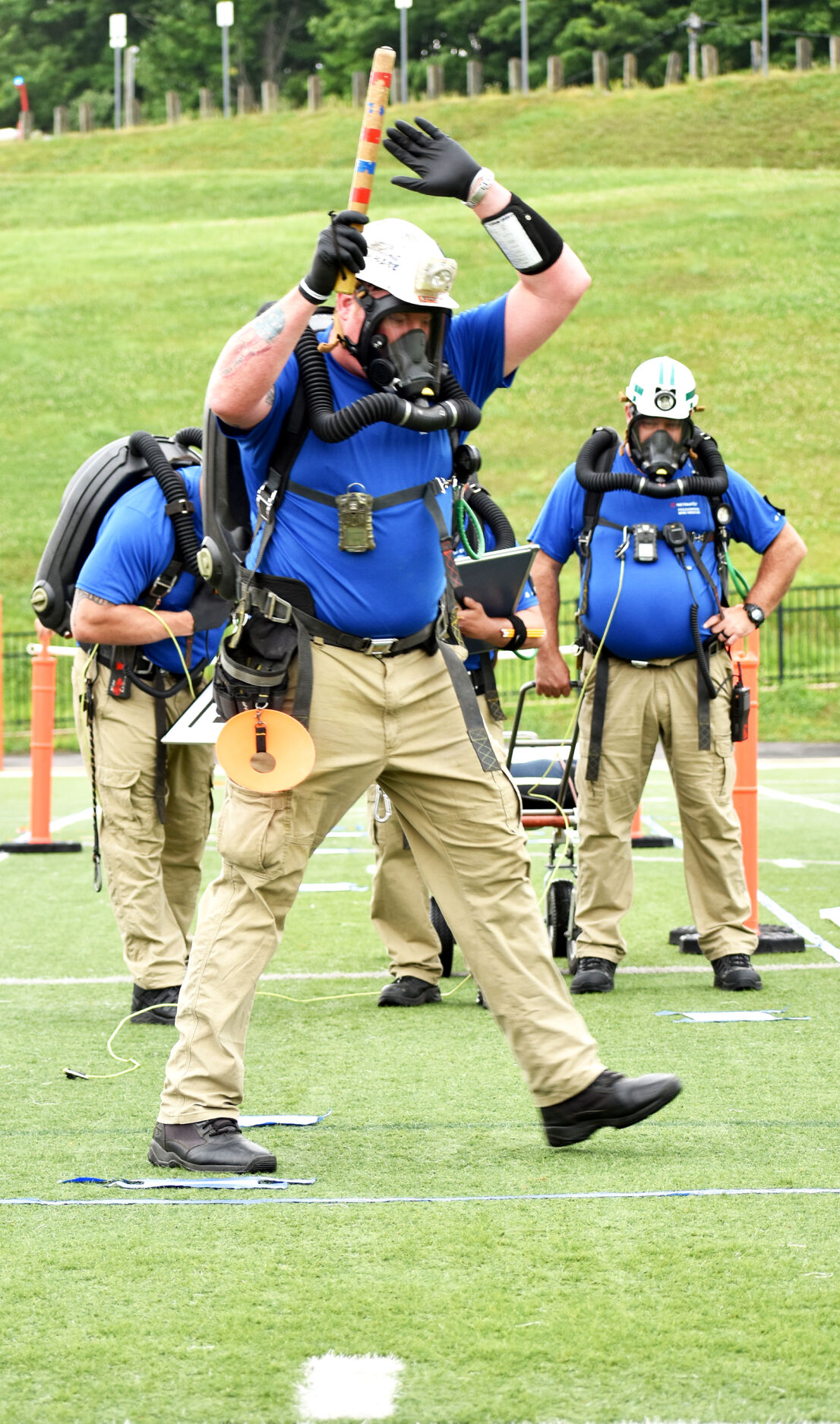Mine Rescue Competition Shows Need for Safety in a Shrinking Sector

By Mike Still
June 10, 2021 - Teams went through their paces on the 40- and 50-yard lines at UVA Wise’s Carl Smith Stadium on Wednesday, but the competition was not about football.
Virginia Department of Mines, Minerals and Energy referees watched as five Southwest Virginia mine rescue teams went through their paces at the Governor’s Cup Mine Rescue Competition. Blue painter’s tape “passages” and paper sheets labeled with various obstacles, methane presence and damaged equipment turned the outdoor turf into underground mine disasters for the competing teams.

A Metinvest mine rescue team member does a mock methane level check before his team movies further inside a simulated underground mine disaster scene at Wednesday's Governor Cup Mine Rescue Competition at UVA Wise.
Photo: Mike Still, TimesNews
Chris Whitt, DMME’s Emergency Manager, said the Governor’s Cup is one of various competitions that the teams can enter to meet an annual requirement of two such events each year.
While each team may not have to make their way through dust, piles of debris, flammable atmosphere or other obstacles, the members each wear most of the gear they would need when entering those situations.
“These teams are more important because there’re fewer teams around these days,” Whitt said. A shrinking number of Southwest Virginia coal underground mines has almost eliminated underground “steam” coal mines supplying power plants, he said, and mines producing metallurgical coal for steam production make up most of the remaining active mines in the region.
Each of the five teams in Wednesday’s competition navigated a simulated mine section methodically, with at least two members cross-checking plotting boards of the mine layout.
A point man on each team did frequent methane sensor sweeps and looked for obstacles such as rock falls, crushed machinery or whatever situation paper labels on the layout showed.
Whitt said the small number of teams reflects the changes in the coal industry.
“Even 10 years ago you would have seen as many as 18 teams at this competition,” Whitt said.
“It’s tough to have these competitions with the pandemic and social distancing,” said Whitt, “but it’s good practice and everyone gets to know each other.”
Each team also kept radio contact with a liaison member at a table near the layout entrance. Whitt said the liaison, in a real situation, would be with the team and maintaining communications with above-ground coordinators.
Other team members pulled a wheeled cart with rescue, breathing and first aid gear. The cart converts to a stretcher to recover victims, as Whitt later demonstrated when one team needed a “victim” to complete its rescue.
Wednesday’s clouds and humidity left all the teams sweat-soaked as they wore rebreather mask units, personal safety equipment and all but heavy protective clothing through each exercise. Referees followed them, checking how they followed movement and safety procedures.
Whitt said mine safety has improved in the past three decades, with the 1992 Southmountain underground explosion in Wise County being the last disaster of its kind in the state. Roof fall incidents have also become rarer since the 1990s with improved underground roof control systems.
“In the 12 years I’ve been in this position, most of the accidents we’ve seen have been machinery related,” Whitt said. “They’re more the type of industrial accidents where mining is not a factor, and even those accidents are declining because of improved proximity access devices that make it harder to get caught in a machine.”
Ventilation and gas buildup are still a major focus for safety efforts, Whitt said.
Watching teams go through their paces, DMME Deputy Director Jennifer Palestrant said she was impressed with their performance.
“Even with a decline in the number of underground mines, you can never focus too much on the safety aspect of mining,” Palestrant said.
Five teams competed on Wednesday: Wellmore Coal Company, Metinvest Pocahontas, Paramont Contura, Alden Resources and Virginia Small Operators. Wellmore’s Team received the Governor’s Cup, with Alden Resources in second place. In the pre-shift procedures competition, Contura Energy’s Frankie Moore received first-place honors and Todd Ward of Wellmore took second place.
“It’s good in an emergency to know you’ll see familiar faces if you ever have to respond to an emergency,” Whitt said.

